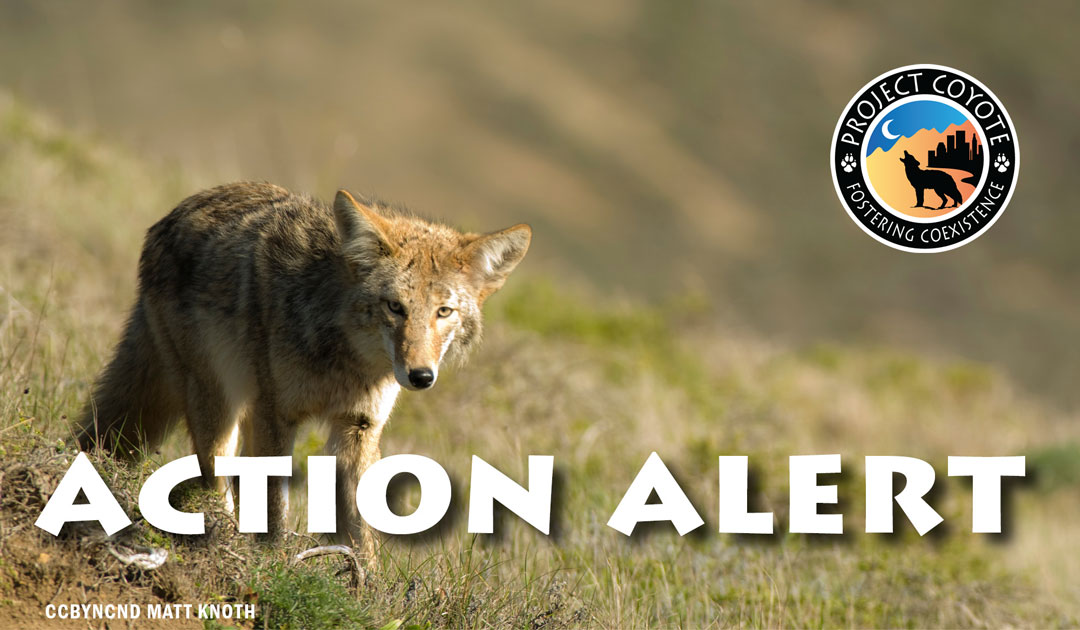Help Us Protect Vermont’s Wildlife!
Speak up before Feb. 10 to support S.129, S.201, & S.281
Thank you to everyone who has submitted comments in support of S.281, a bill in the Vermont Senate that would ban the barbaric practice of abusing hounds to chase and kill coyotes (“hound hunting”).
On Wednesday, Feb. 2, the Vermont Senate Committee on Natural Resources & Energy discussed the bill and heard a few minutes of testimony. They plan to continue their discussion from 5:30-7 p.m. ET on Thursday, Feb. 10, and we need you to take action to make sure this bill is passed! Normally, we would ask you to attend this meeting and provide oral testimony, however, the committee has closed registration for this meeting. We’re confused as to why the state isn’t allowing all residents, who would like to speak on matters that they care about, to be heard.
The committee will also be discussing two additional bills that need your help, S.201 to ban leghold traps, and S.129 to make the Vermont Fish and Wildlife Board advisory only. Collectively, all three of these bills will move Vermont forward and help protect wildlife.
We need to show strong support for these bills. We know that hounders and trappers will fiercely oppose them, so your voice and action are vital. Please act TODAY in support of these bills to protect Vermont’s wildlife!
Show your support for these bills by:
- Submitting written testimony here using the talking points below. Please be sure to submit your written comments before the meeting on Thursday, Feb. 10. Since the public meeting is closed, this is the only way to speak directly to the committee on this matter. If you would like to live stream the meeting you can do so here.
- Follow the bills’ progress here, support them in the House Committee on Natural Resources, Fish, and Wildlife (the next committee to which the bills are assigned), and in floor votes. Learn more about how a bill becomes law in the VT General Assembly
- Write a Letter to the Editor (LTE) and submit it to your local newspaper.
- Encourage fellow Vermonters to support all three Senate bills (129, 201, & 281) as they hopefully advance out of this committee and toward eventual passage.
- Use the talking points below, and see tips on LTEs here.
- Spread the word by sharing this alert with other VT residents and encourage them to take action on behalf of Vermont’s wildlife!
Talking Points, Please Personalize!
S. 201: an act relating to the use of leghold traps
Traps are cruel and killing methods are unregulated. Animals captured in leghold traps may succumb to exposure, dehydration or predation, and may even chew off their own limbs trying to escape. There are no standards that dictate how trapped animals must be killed. They are bludgeoned, stomped on (to crush the animal’s heart and lungs), drowned, strangled and killed by other inhumane methods. If the animal is “lucky,” s/he is shot (but bullets are rarely used as they damage the pelt).
Traps are inherently indiscriminate and are responsible for injuring and/or killing protected and endangered species each year in Vermont, as well as dogs and cats.
Non-lethal methods are more effective at protecting public health, companion animals and livestock.
Traps endanger the public and family dogs. Traps may be set on public land, including National Wildlife Refuges, with no required signage or setbacks from trails or entry points.
The vast majority (75%) of Vermont residents want to ban trapping. Read more about the University of Vermont’s 2017 poll here.
Traps are increasingly banned globally and across the U.S. They have been banned in 88 countries. Their use is banned or restricted in several U.S. states, including Arizona, California, Colorado, Florida, Massachusetts, New Jersey, New Mexico, Rhode Island and Washington.
S.129: an act relating to the management of fish and wildlife
The Vermont Fish and Wildlife Board does not represent the majority of Vermonters. The board is chosen, not elected. Politically-appointed commissions that are stacked with special interest groups, consumptive users and agricultural representatives should not be responsible for making decisions for all Vermonters.
Fish and wildlife boards that are politically chosen focus on:
-
- Producing a “harvestable surplus of game animals” rather than conserving all species and ecosystems
- Giving preference to consumptive wildlife users (hunters, anglers and trappers) over the broader public
- Hostility towards carnivores like wolves and coyotes, which are seen as competitors with hunters for game animals, or as threats to livestock
Fish and wildlife board members do not have to have a scientific background or knowledge of wildlife and ecosystems. This makes them unqualified for making decisions related to wildlife. The board is also not required to consider fish and wildlife biologists, as happened in 2016 when biologists advised against a proposal to extend bobcat trapping. This proposal went to a vote and was only defeated by a single vote.
The regulated should not regulate themselves. Hunters, trappers and anglers should not be responsible for deciding the regulations they and others of these groups have to follow. How can the public trust them to uphold the Public Trust Doctrine and protect our wildlife when board members have inherent conflicts of interest?
S.281: an act relating to hunting coyotes with dogs
Hound Hunting of Coyotes: Hunting with hounds is not wildlife management; it violates fair chase principles and is increasingly opposed by hunters and the public alike. Vermont’s coyotes are a vital part of the ecosystem and do not need lethal management.
Most residents and many hunters in Vermont do not support this cruel form of hunting. Hounding is legalized dogfighting. Hunting with hounds stresses coyotes, even if they are not killed at the end of the chase. During the training season, nursing mothers waste vital calories fleeing from hounds. Pups are also in direct danger if they can’t flee from the hounds fast enough or if one or both of their parents are killed by hounds, leaving them orphaned.
Hounding is cruel to dogs, coyotes, and non-target wildlife. Hounds can become injured and stressed, especially during hot weather. Hunters often have no control over their hounds, who are miles away and can be hit by cars or trespass on private property while in pursuit of wildlife. Because hounds track prey for long distances, they invariably pursue and stress non-target animals including deer, moose, small mammals, and ground-nesting birds.
Coyotes are integral to Vermont’s ecosystems. They provide ecosystem services such as pest and disease control by eating rabbits and rodents like white-footed mice, which can carry ticks that cause Lyme disease. Coyotes also help suppress populations of raccoons, skunks, and other small carnivores, which leads to healthier and more diverse populations of birds.
Thank you for helping to protect wildlife in Vermont!
Thank you for taking action and please share this alert with other Vermonters.
Camilla H. Fox
Founder & Executive Director
Michelle Lute, PhD
National Carnivore Conservation Manager



